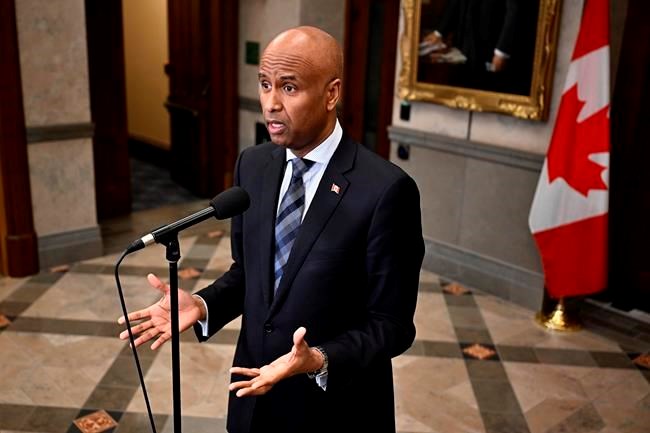OTTAWA — International Development Minister Ahmed Hussen's office confirmed late Wednesday that Canada is working to airdrop humanitarian aid to the Gaza Strip as soon as possible.
Olivia Batten, a spokesperson for Hussen, specified that no airlifts would happen using Canadian military aircraft.
Hussen said earlier on Wednesday that Ottawa was exploring new options to deliver aid to the besieged Palestinian territory as the Israel-Hamas war continues.
He said "airdrops of aid into Gaza, in partnership with like-minded countries like Jordan," was on the table.
"I just came back from the region, and Canadian aid is making a difference," he told reporters on Parliament Hill.
After visits to Jordan and Egypt last week, Hussen said the provision of aid to Palestinian civilians is nowhere near what's needed.
He said a tedious inspection process at the Rafah border crossing between Egypt and Gaza was slowing down the movement of supplies brought in by truck.
Canada has put $100 million toward aid for the besieged territory since the start of the conflict, including $40 million committed last month.
Aid convoys carrying food reached northern Gaza this week, Israeli officials said Wednesday, the first major delivery in a month to the devastated, isolated area.
The increasing alarm over hunger across the territory has fuelled international calls for a ceasefire, as the United States, Egypt and Qatar work to secure a deal between Israel and Hamas for a pause in fighting.
The two sides remain far apart publicly in their demands.
A pause would allow for the release of some of the hostages seized by Hamas in its Oct. 7 attack on Israel in which Hamas militants killed 1,200 people and took roughly 250 hostages. About 130 hostages remain after some were released during a temporary ceasefire in November.
Israel says about a quarter of the hostages are dead.
The Israeli military's assault on Gaza, which it says aims to destroy Hamas, has been relentless.
Officials in the territory, which is controlled by Hamas, say more than 29,900 Palestinians are dead.
Israel has barred entry of food, water, medicine and other supplies except for a trickle of aid entering at the Rafah crossing and Israel's Kerem Shalom crossing.
Despite international calls to allow in more aid, the number of supply trucks entering has dropped dramatically in recent weeks.
UN officials are warning of further mass casualties if Israel follows through on vows to attack Rafah, where more than half of Gaza's population of 2.3 million has taken refuge.
They also say a Rafah offensive could collapse the aid operation that has already been crippled in the fighting.
This report by The Canadian Press was first published Feb. 28, 2024.
— With files from The Associated Press.
The Canadian Press



